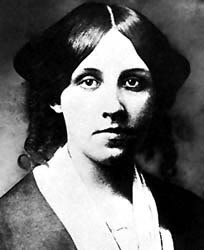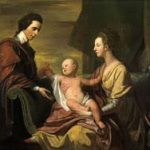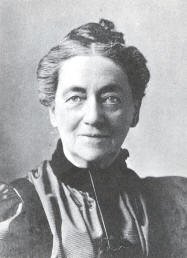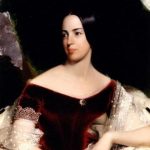Writer and Plantation Mistress in the Civil War Era
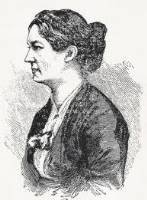 Louisa Susanna McCord, political theorist, essayist, poet and book reviewer, was almost unique among antebellum southern women. Her published works fill two volumes and deal with subjects hardly touched by her female contemporaries. At the same time, she ran a plantation, supported her family and was the hard-hitting superintendent of an army hospital during the Civil War. She was in many ways an emancipated woman.
Louisa Susanna McCord, political theorist, essayist, poet and book reviewer, was almost unique among antebellum southern women. Her published works fill two volumes and deal with subjects hardly touched by her female contemporaries. At the same time, she ran a plantation, supported her family and was the hard-hitting superintendent of an army hospital during the Civil War. She was in many ways an emancipated woman.
Childhood and Early Years
On December 3, 1810 Louisa Susanna Cheves was born into the aristocratic Charleston, South Carolina family of Langdon and Mary Dulles Cheves. Louisa was one of fourteen children, eight of whom died before 1860. Her father was a politician and her mother’s family was closely tied to the planter elite of South Carolina, providing access to the highest social circles.
The family lived in several different places during Louisa’s early years following Langdon Cheves’ political career, including a residence in Philadelphia. Louisa attended girls’ schools in Philadelphia and learned mathematics and Latin with her brothers at home. Louisa was very well educated and confident in her own abilities.
As the daughter of a politician, she was exposed from an early age to political discussions of national events by some of the most powerful men of her time. Her father was the South Carolina attorney general before being appointed to the US House of Representatives, and he succeeded Henry Clay as Republican Speaker of the House. He declined cabinet and Supreme Court appointments to become president of the Bank of the United States.
In 1829, the Cheves family returned to live in South Carolina permanently. Louisa’s father became a wealthy planter, owning four plantations and three hundred slaves. Her mother died young, leaving her responsible for the household and the younger children. Although her sister soon married, Louisa remained at home and cared for her father and siblings after her mother’s death.
In 1840, at age 30, Louisa married David James McCord, a politician and attorney thirteen years her senior. He was a widower whose first wife had died after bearing thirteen children, but Louisa refused to become a stepmother to his children from that marriage. Together Louisa and David had three children, and she carefully educated and groomed her only son for a career in politics.
Langdon Cheves gave Louisa a plantation in her own name, Lang Syne cotton plantation in Fort Motte, South Carolina. Struggling against her own ambition to adapt to the era’s standards of femininity, she ran the plantation and largely supported the family, but she found her greatest fulfillment in writing. Her published works include a play, a book of poetry and many essays.
Writing Career
In 1848 her husband asked her to translate Bastiat’s Sophimes Economiques, an essay which argued against protective tariffs, and her skilled translation attracted the attention of editors who solicited her essays on economics, politics, slavery and women’s rights.
Between 1848 and 1856, some thirteen essays and a play, Caius Gracchus, appeared in print, in which McCord articulated a defense of slavery as well as a conservative view of women’s place in society. Most of her essays appeared anonymously or with only her initials, for women writers were not taken seriously, and it would have been considered bad form for a woman to write about such controversial issues.
She vehemently supported slavery and the subjugation of women, believing that women should be educated but should refrain from public life: “Woman was made for duty, not for fame.” She believed that a woman must sacrifice her own ambitions and desires for the good of her family and society.
McCord’s life was a paradox. Her personal experiences did not reflect the social ideals she advocated in her writing. While supporting the social subordination of women, she also sought a public voice for herself. She cultivated and maintained an active intellectual life by associating with the faculty of South Carolina College (now the University of South Carolina).
Writing in the Southern Quarterly Review, one of the leading Southern periodicals of the time, McCord questioned the results that would flow from the reforms of the law that Harriet Beecher Stowe sought in her novel Uncle Tom’s Cabin (1852):
Make your law to interfere with the God-established system of slavery, which our Southern states are beautifully developing to perfection, daily improving the condition of the slave, daily waking more and more the master to his high and responsible position; make your laws, we say, to pervert this God-directed course, and the world has yet to see the horrors which might ensue from it.
Family tragedy struck Louisa McCord repeatedly in the 1850s and 1860s, and brought her writing career to an abrupt end. Her husband David died suddenly in May 1855. Her grief from his death had not subsided when, in August 1855, her brother Charles succumbed to ‘country fever,’ one of the many epidemics that hit the plantations every summer.
Langdon Cheves was so distraught over the loss of his son that he suffered a stroke, and never fully recovered. Louisa brought her father to live with her and served as his caretaker until his death a year and a half later. After his death, she worked tirelessly to honor her father’s memory, commissioning a statue of him for the South Carolina State House.
A lawsuit contesting Langdon Cheves’ will pitted the remaining siblings against each other in a bitter rivalry, destroying his family in the process. Louisa fell into a deep depression from which she was finally lifted by the challenges of the Civil War.
The Civil War
McCord threw all of her resources into the defense of the Confederacy. She donated horses, slave labor and time. She assumed the presidency of the Soldier’s Relief Association and the Ladies’ Clothing Association, and served as matron of the army hospital on the campus of South Carolina College.
Most of the men in McCord’s extended family died for the Southern cause. After her only son was killed at the Battle of Bull Run, her friend, diarist Mary Boykin Chesnut, wrote, “She is dedicating her grief for her son… by giving up her soul and body, her days and nights, to the wounded soldiers.”
In February 1865, McCord was still living in Columbia, when General William Tecumseh Sherman approached the city. The Union army marched into her Columbia home and seized it for the headquarters of General Oliver O. Howard, while Louisa blocked the staircase to protect the women who were hiding on the second floor.
The war ended, and so did slavery. Louisa McCord relinquished the management of her plantation to a son-in-law, and fled to Ontario rather than take the oath of allegiance to the United States, hoping that a visit to relatives there might alleviate another deep depression. The arrival of grandchildren finally raised her spirits.
She returned to the United States and spent the rest of her life with her daughter in Charleston. Just as she was settling into a peaceful old age, she fell ill with ‘gout in the stomach.’
Louisa Cheves McCord died November 23, 1879 at the age of sixty-nine.
Few of McCord’s personal documents survived the Civil War – her slaveholding records were destroyed, and she did not leave a diary. So it is difficult to reach a conclusion about her life. It seems to me that she was constantly battling with her own desires, attempting to make a comfortable place for herself in Southern society, while also trying to live up to her own ideals.
SOURCES
A Woman of Contradictions
Louisa McCord and Antebellum Southern Legal Thought
Portraits of American Women Writers: Louisa S. McCord
